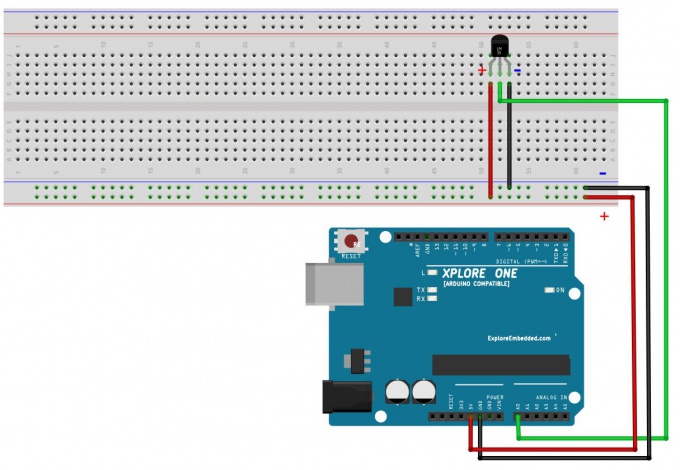Difference between revisions of "9 What is temperature there? with LM35"
| Line 18: | Line 18: | ||
// These constants won't change. They're used to give names | // These constants won't change. They're used to give names | ||
// to the pins used: | // to the pins used: | ||
| − | const int analogInPin = A0; // Analog input pin that | + | const int analogInPin = A0; // Analog input pin that the LM35 is attached to |
const int analogOutPin = 9; // Analog output pin that the LED is attached to | const int analogOutPin = 9; // Analog output pin that the LED is attached to | ||
int sensorValue = 0; // value read from the LM35 | int sensorValue = 0; // value read from the LM35 | ||
Latest revision as of 16:04, 15 September 2014
Code
/* What is temperature there with LM35 Reads an Temperature with LM35 Sensor . Also prints the results to the serial monitor. The circuit: * LM35 is connected to analog pin 0. Center pin of the LM35 goes to the analog pin. side pins of the LM35 go to +5V and ground * LED connected from digital pin 9 to ground(If required) */ // These constants won't change. They're used to give names // to the pins used: const int analogInPin = A0; // Analog input pin that the LM35 is attached to const int analogOutPin = 9; // Analog output pin that the LED is attached to int sensorValue = 0; // value read from the LM35 int outputValue = 0; // value output to the PWM (analog out) void setup() { // initialize serial communications at 9600 bps: Serial.begin(9600); } void loop() { // read the analog in value: sensorValue = analogRead(analogInPin); // map it to the range of the analog out: outputValue = map(sensorValue, 0, 1023, 0, 255); // change the analog out value: analogWrite(analogOutPin, outputValue); // print the results to the serial monitor: Serial.print("Voltage in mV = " ); Serial.print(sensorValue*5); Serial.print("\t Temperature in Degree Celsius = "); Serial.println(outputValue*2); // wait 2 milliseconds before the next loop // for the analog-to-digital converter to settle // after the last reading: delay(2); }

